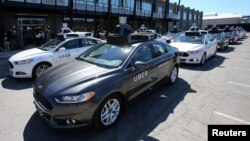Self-driving car prototypes appear to be getting better at negotiating California streets and highways without a human backup needing to intervene, according to data made public Wednesday by California transportation regulators.
The data reflect safety-related incidents reported by 11 companies that have been testing more than 100 vehicles on public roads, primarily in the Silicon Valley neighborhoods where the technology has grown up. The reports were made to California's Department of Motor Vehicles, which posted them online.
The documents catalog the number of times from December 2015 through the end of November that humans took control from a car's software for safety-related reasons.
Waymo shows improvement
Waymo, as Google's self-driving car project was recently rebranded, did far more testing than the other 10 companies combined.
Waymo reported that its fleet drove itself more than 635,000 miles with 124 safety-related “disengagements” — the equivalent of two incidents every 10,000 miles. That was a notable improvement over the prior year, when there were eight incidents per 10,000 miles.
A reportable disengagement happens when the technology fails or the backup driver takes control out of concern the car is malfunctioning.
Collisions must be reported
Though imperfect, the data are the best peek the public gets into the fiercely competitive world of self-driving cars and how the prototypes are performing. California required the disengagement reports as part of regulations governing testing on public roads. Separately, the state also requires companies to report any collisions involving its cars.
The Department of Motor Vehicles has been working on regulations that will define how the technology can be rolled out to the public when companies believe it is ready. When that will happen depends on several factors, including regulators' readiness and company confidence the vehicles are safe.
Final rules due in six weeks
While Tesla's Elon Musk has been bullish, talking about months rather than years, companies such as Waymo have suggested 2017 or 2018 is more realistic.
The state expects to release final version of the “public operation” regulations within six weeks, according to Melissa Figueroa, a spokeswoman for California's top transportation official.
The Department of Motor Vehicles made public a first draft in December 2015, nearly a year after final rules were supposed to be in place, and has since revised the language based on developments at the federal level and input from industry and other groups.




